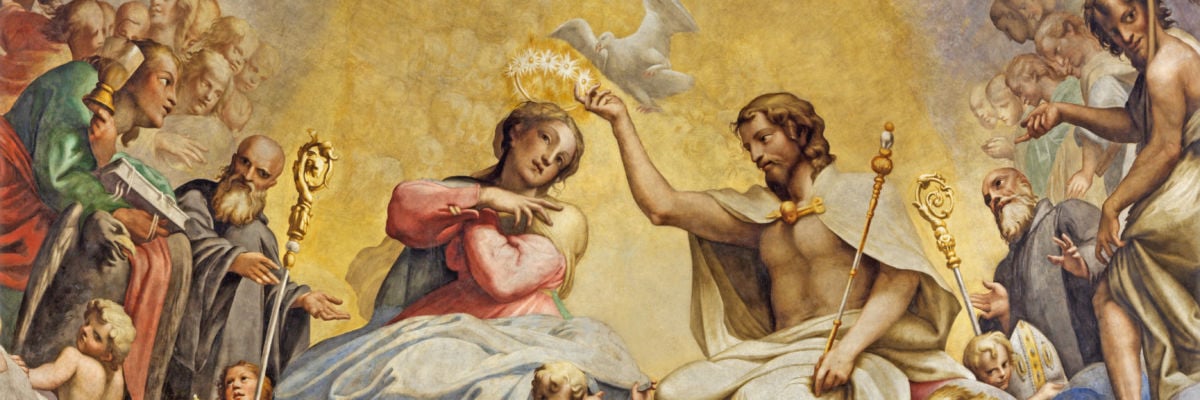
Homily for the Sixteenth Sunday in Ordinary Time
Brothers and sisters:
The Spirit comes to the aid of our weakness;
for we do not know how to pray as we ought,
but the Spirit himself intercedes with inexpressible groanings.
And the one who searches hearts
knows what is the intention of the Spirit,
because he intercedes for the holy ones
according to God’s will.-Rom. 8:26-27
“I don’t know how!” How often have we heard this from our children when they are presented with a task or activity with which they are unfamiliar or which is not to their liking. Next comes “It’s too hard!” and then either the victory of “Now I get it!” and “Look at me!” or of the discouragement of “I’m not good at it!” and even the defeat of “It’s not fair!” Then we do the task for them and come back to it another day until they get it. “Practice makes perfect,” and “If at first you don’t succeed, then try, try again!” are what my mother used to say with her relentlessly cheerful attitude. (She was a kindergarten teacher, and knew how to encourage!)
Do we really not know how to pray as we ought? St Paul tells us that this is so, and that this is because of our weakness. For this reason the Holy Spirit supplies for our lack and moves in our hearts, interceding for us “with inexpressible groanings.” In this way God the Holy Spirit mysteriously and even mystically moves us in spite of ourselves, just like a persistent mother whose child cries “I can’t” or “I won’t” and so keeps after him until he learns how he can and will. She knows he has it in him, and she helps to bring it out. The Holy Spirit is a spirit of encouragement.
The child may groan in weakness, but the mother groans inwardly even more, longing for the growth and maturity of her son, and so she performs her work of intercession, supplying enlightenment and motivation, like the Holy Spirit. This natural comparison from our own lives is more to the point when we consider how closely the Holy Spirit and the Blessed Mother work in us that we may become a likeness of Christ. He too must be “incarnate” in us by the work of the Holy Spirit and the Virgin Mary. Thus in the book of Revelation the woman clothed with the Sun cries out in anguish, bringing forth the Church in time of trial. The mysterious book concludes practically with the words “The Spirit and the bride say, ‘Come!’” And that means the bride—the whole Church with Mary—cries out for the coming of Jesus in the Holy Spirit, who moves us to pray in the Church and in and with Mary.
This is all grand and deep and links our natural human life and our day to day prayer with the greatest mysteries of Heaven and of history. No wonder if the work of prayer is beyond our knowledge and ability!
But St. Paul says that we do not know how to pray as we ought. He more than implies that there is something “in our weakness” we are not contributing to the work of prayer, which we ought to. Divine assistance is necessary for the work of God in us, but what about what we are supposed to supply? One of the strangest and yet most common things about devout Christians is how often they complain that they do not pray enough or do not know how to pray. Yes, like little children who need encouragement.
Sometimes the best encouragement is a dose of realism. Examine yourself: how often do I pray and how much?
“It is the infrequency of prayer which makes prayer so difficult,” says Pusey, the old friend of St John Henry Newman. The things we find easy to do have become the habits of our bodies and our minds. As children, even from infancy it was by constant practice that we learned. By constantly gazing at objects, first closer, then farther, we began to focus and then had a clear sight for the rest of our lives. The same goes for the use of our hands and feet, becoming steady and able from our first steps to our first cane. We have to pray often with short prayers as we go about our work. St Paul tells us to “pray without ceasing.”
The Holy Names of Jesus and Mary, the Glory be, the Jesus Prayer, the Guardian Angel Prayer, the “Eternal Rest” or the great apocalyptic prayer we just mentioned, “Come, Lord Jesus!”—these we can say over and over while we are doing just about anything else, dressing, showering, walking, entering repetitive data, cooking, cleaning, repairing, dribbling, punting, swimming, washing, and waiting. If we do this, then we will come to our longer times of prayer, our Rosary, our spiritual reading, our adoration, our praying parts of the Divine Office with deeper resources and a more natural recollection. It’s not just about quality or feeling, it’s also about quantity and persistence.
But if there’s any difficulty or resistance or obstacle, then just go back to the beginning to our Blessed Mother and she will help you. The Venerable Archbishop Sheen made popular the poem “Lovely Lady Dressed in Blue.” This poem for all its genuine sentimentality makes the point of prayer for us who do not know how to pray as we ought. The point is deep mysteries of faith lived out frequently in the ordinary duties of life:
Lovely Lady dressed in blue,
Teach me how to pray!
God was just your little boy,
Tell me what to say!Did you lift Him up, sometimes,
Gently on your knee?
Did you sing to Him the way
Mother does to me?Did you hold His hand at night?
Did you ever try
Telling stories of the world?
O! And did He cry?Do you really think He cares
If I tell Him things ——-
Little things that happen? And
Do the Angels’ wingsMake a noise? And can He hear
Me if I speak low?
Does He understand me now?
Tell me ——-for you know.Lovely Lady dressed in blue ——-
Teach me how to pray!
God was just your little boy,
And you know the way.



